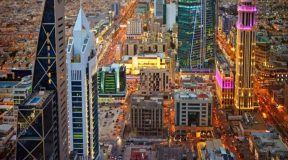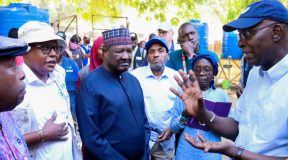It was a chance meeting between OpenLife and Ambassador Jens-Petter Kjemprud, the Norwagian Ambassador to Nigeria at the May 22-23 Nordic-Nigeria Connect conference at Radisson Blu Hotel, Lagos.
Discussions and analyses were such that there was need for a post conference chat specifically on the ties between Nigeria and Norway.
But the desire to have it “as soon as possible” could not materialize as he had to travel to Norway for another maritime summit.
But being a man of his word, he gave the best of co operation for the interview as soon as he returned on July 2.
His understanding of Africa including the socio-economic and political bearings of the Continent is not in doubt having worked in different capacities across many countries in Africa.
Between 2001 and 2006, he was on the board of Nordic-Africa Institute.
Before then, he had been an Associate Protection Officer, UNHCR, from 1988 to 1989 in Mogadishu, Somalia; Senior Executive Officer, Labour Inspection from 1989 to1990; Project Secretary, International Department, Norwegian Confederation of Trade Unions from 1990 to1992; Executive officer, Senior Executive Officer, Advisor 1992- 1997, Ministry of Foreign Affairs; Counsellor and Deputy Head of Mission, Royal Norwegian Embassy, Addis Ababa, Ethiopia from 1997 to 2000;Advisor, Bilateral Department, Ministry of Foreign Affairs from 2000 to 2001; Assistant Director General, Deputy Head of Section for African Affairs, Ministry of Foreign Affairs from 2001 to 2004; Deputy Director General, Head of Section for East and Central African Affairs from 2004 to 2006; Ambassador to Ethiopia and African Union; accredited also to Djibouti as well as NATO liaison ambassador to the African Union from 2006 to 2010; Ambassador to Sudan; accredited also to Central African Republic and Chad from 2010 to 2012; Ambassador to Iran from 2012 to 2014; Special Envoy to Sudan and South Sudan from 2014 to 2016; Ambassador to Nigeria, also accredited to Benin, Cameroon and Togo since 2016 till date.
For the government of Norway to continuously trust him with such sensitive positions, he had distinguished him academically by obtaining Examen Atrium, Drammen gymnasium and Ex. Philosophicum from the University of Oslo between 1976 and 1977 before a degree in Law at the same University of Oslo in 1983.
Born on July 18, 1955, the father of two children speaks Norwegian mother tongue, English as working language and limited abilities in French.In this exclusive interview with OpenLife, he speaks on the economic outlook between Norway and Nigeria.
Nigeria and many countries have signed up the Africa Continental Free Trade Area, AfCFTA. What do you think this portends for the black Continent?
It is a big opportunity for those countries that are committed to it and is properly making the right preparations and investments. It will take some time to make it operational. Thus, the time it gives countries to adjust must be used efficiently. Many countries produce the same goods so market research has to be done, while also countries on other continents might pay better. As for Nigeria, it is all about fixing the power sector. Nigeria will never be competitive without a power sector delivering safe, constant and cheap electricity to its manufacturing sector.
Emerging markets, across Africa, are jittery, due partly to the trade war between China and US on one hand and North Korea’s Kim Jong Un’s nuclear power. Do you subscribe to such fears?
The balance of economic power is changing from West to East, everyone has to realize it and make the necessary decisions. It is a reflection of numbers and policies. It seems however inevitable that there will be a struggle from certain quarters to maintain status quo. In a transitional period, this could lead to instability, uncertainty and even conflict, directly or by proxy; and affect Africa.
What are the highlights of the just concluded Nor Shipping 2019 Conference in Oslo?
Nor Shipping conferences are about getting people together; create relations and business contacts, so also this year.
However, it is also about creating visions for the industry. For me, this year was about exchanging views and ambitions for a cleaner, environmental shipping industry, as shipping is a major polluter.
In Norway, we already have the first all-electric ferries. Such ferries would be ideal for the Lagos lagoon.
Norway is described as a rich country. How rich is Norway?
Norway’s
has a GDP of 628.802 million USD making it the 29th biggest economy in the
world (just behind Nigeria), but the richest country in the world per capita
(apart from a few small tax heavens).
What is Norway’s specific policy towards
Africa?
Africa is important, as Africa is the continent of the future. The enormous natural resources, the work force, the energy indicates a bright future for the continent. However, better governance, better policies, better planning and improved negotiation power and unity is necessary for the continent to take advantage of the resources for its own people. Norway offers different assistance mechanisms to assist like Oil for Development, Fish for Development and Tax for Development. We believe in a more fair world, more equal terms; thus we allocate more than 1% of our GDP annually for development cooperation while our Sovereign Wealth Fund gradually are making more investments in the developing countries, like recently in Nigeria; see: nbim.no
What are those areas Norway
has comparative advantage that can attract the world to your country?
We pride ourselves of peace, stability, good governance, a predictable investment climate and a strong economy. We believe strongly in equal rights, as women constitute 50% of the population.
Having women actively as part of our workforce has contributed more to our wealth than the oil.
In a more technical sense, we have an advanced environment for technical knowhow and innovation in subsea offshore oil and gas development.
Norway has not been outspoken
on global affairs but seems vocal on issues relating to Europe and Russia. What
underline your international relations?
I beg to disagree. To a certain extent, we have been very active in particular in conflict prevention in the Palestinian-Israeli conflict, Sri Lanka, Sudanese and South Sudanese conflicts, in Colombia and most recently in Venezuela.
By not being a member of EU, we can act more independently, for example, when our politicians were the first western representatives to meet Hamas.
Nevertheless, you are also right, we believe in cooperation and communication, not confrontation. As one example, we have a much more cordial and close relation to our neighbor Russia than some other Western countries.
What is the ethnic make-up of your country?
Of the population approximately 60.000 are of Sami (a nomadic group straddling the borders of Norway, Russia, Finland and Sweden) while the remaining are ethnic Norwegian.
Today
immigrants constitute nearly 15% of the population coming from all over the
world with the largest groups coming from Poland, Lithuania, Somalia, Sweden,
Pakistan, Syria and Iraq.
As an ambassador, what are the specific goals
you intend to achieve for your country?
There are plenty: primarily sound bilateral relations, increased trade and investment, finding common ground on the multilateral arena and if possible contribute to alleviate conflicts and work for a more just society where people are equal. The increasing number of conflicts in Nigeria, and the number of people living under the poverty line alarm me. Things have to change, or else “Things will fall apart.”
What are your projections for Nigerian in view of the beginning of a fresh tenure for Buhari’s government?
I sincerely believe the Buhari administration should revert to the issues defined before the 2015 elections and repeated in this year’s election campaign.
They are: resolving the conflict in the North East which would also have to include dialogue; eradicate corruption through EFCC, the court system, the press and not the least by politicians own behavior keeping out of corrupt practices and improving the economy through increased and targeted efforts towards diversification of the economy.
In that process, and not the least important, assure better distribution of wealth through the opposite of the Mathew principle (Mathew 12.13): make the poor richer and the rich poorer. If not Nigeria is heading towards a revolution.
How can Nigeria become a true economic and
political leader in Africa?
Without sounding arrogant, I would say the above just mentioned measures and by fixing the power sector, Nigeria would move on to the position as economic and political leader of the continent.
How many Norwagian billionaires in dollars exist and what impact do they make on the local economy?
We have fewer than 20 USD billionaires in Norway, some from the same family. Traditionally Norway and the Nordic countries have had a model for society based on equality based on Socialist/Social democratic and Christian values (the Nordic welfare state model) where the state both had a strong hand in the economy and secured the welfare of the population. It is only the last 20-30 years that a more liberal order has developed, threatening the Welfare State.
How peaceful is Norway? Can you point specific cultural cum tourism interests in Norway?
Norway is a very peaceful and stable country and we strive to welcome tourists. Tourism is an important industry.
Fjords (a fjord is a deep, narrow and elongated sea, with steep land on three sides), mountains, glaciers, untouched nature and a long coastline from south to the northernmost point of the world North Cape, makes Norway worth visiting.







